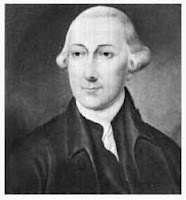Joseph Hewes represented North Carolina at the Continental Congress of 1774. He was living at Edenton at the time. At the beginning of the year 1776, Hewes was appointed as the first ever Secretary of the Navy John Adams often said that Hewes "laid the foundation, the cornerstone of the American Navy." Alongside General George Washington, Hewes became one of the greatest military achievers in American history. He was also involved with the secret committee of claims, which further promoted the independence of the colonies. Hewes was one of the primary reasons why North Carolina submitted to independence before any other colony. Hewes was initially faced with an ill equipped navy of which to fight the British Navy. To remedy this, he provided his own extensive fleet of ships, outfitted them, and chose the most capable of men to captain these ships. John Paul Jones was one of these captains for whom Hewes was instrumental in providing a command. (Used by Permission Wikipedia)
John Penn was a signer of the United States Declaration of Independence and the Articles of Confederation as a representative of North Carolina. Penn was distantly related to William Penn, founder of Pennsylvania. Penn was elected to the North Carolina Provincial Congress and elected by that body to the Continental Congress in 1775 until 1780. For the 1776 signing of the Declaration of Independence, he was part of a three-man North Carolina delegation that included Joseph Hewes and William Hooper. He also served on the Board of War until 1780, when he retired to the practice of law. (Used by Permission Wikipedia)
William Hooper was an American lawyer, politician, and a member of the Continental Congress representing North Carolina from 1774 through 1777. Hooper was also a signer of the United States Declaration of Independence, along with fellow North Carolinians Joseph Hewes and John Penn. Initially Hooper supported the British colonial government in North Carolina. As Deputy Attorney General in 1768 Hooper worked with Colonial Governor William Tryon to suppress a rebellious group known as the Regulators who participated in the War of the Regulation. The Regulators had been operating in North Carolina for some time, and in 1770 it was reported that the group dragged Hooper through the streets in Hillsborough during a riot. Hooper advised that Governor Tryon use as much force as was necessary to stamp out the rebels, and even accompanied the troops at the Battle of Alamance.Hooper’s support of the colonial governments began to erode, causing problems for him due to his past support of Governor Tryon. Hooper had been labeled a Loyalist, and therefore he was not immediately accepted by Patriots. Hooper eventually was elected to the North Carolina General Assembly in 1773, where he became an opponent to colonial attempts to pass laws that would regulate the provincial courts. This in turn helped to sour his reputation among Loyalists. Hooper recognized that independence was likely to occur, and mentioned this in a letter to his friend James Iredell, saying that the colonies were “striding fast to independence, and ere long will build an empire upon the ruins of Great Britain.” During his time in the assembly Hooper slowly became a supporter of the American Revolution and independence. After the governor disbanded the assembly, Hooper helped to organize a new colonial assembly. Hooper was also appointed to the Committee of Correspondence and Inquiry. In 1774 Hooper was appointed a delegate to the First Continental Congress, where he served on numerous committees. Hooper was again elected to the Second Continental Congress, but much of his time was split between the congress and work in North Carolina, where he was assisting in forming a new government. Due to matters in dealing with this new government in North Carolina, Hooper missed the vote approving the Declaration of Independence on the Fourth of July, 1776; however, he arrived in time to sign it on August 2, 1776. (Used by permission Wikipedia)
All of the signers were men of courage risking all of their goods, lands and lives. During this time of celebration of their act, it is right that we should remember.
Visit my Website
Follow us on Facebook




